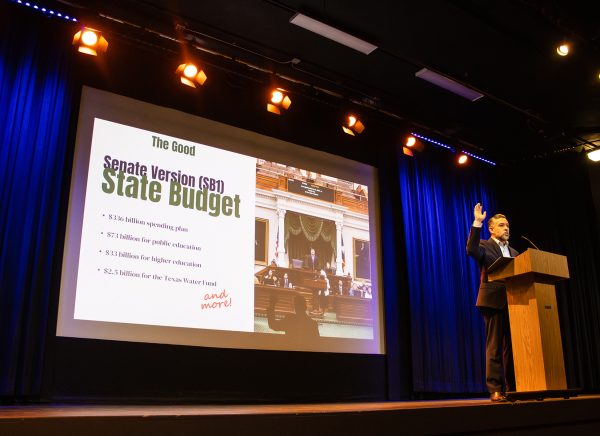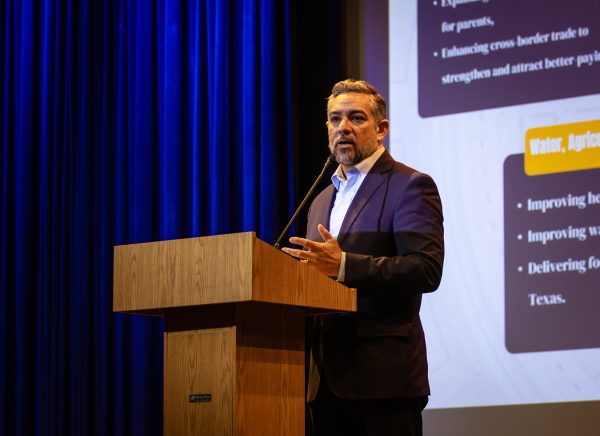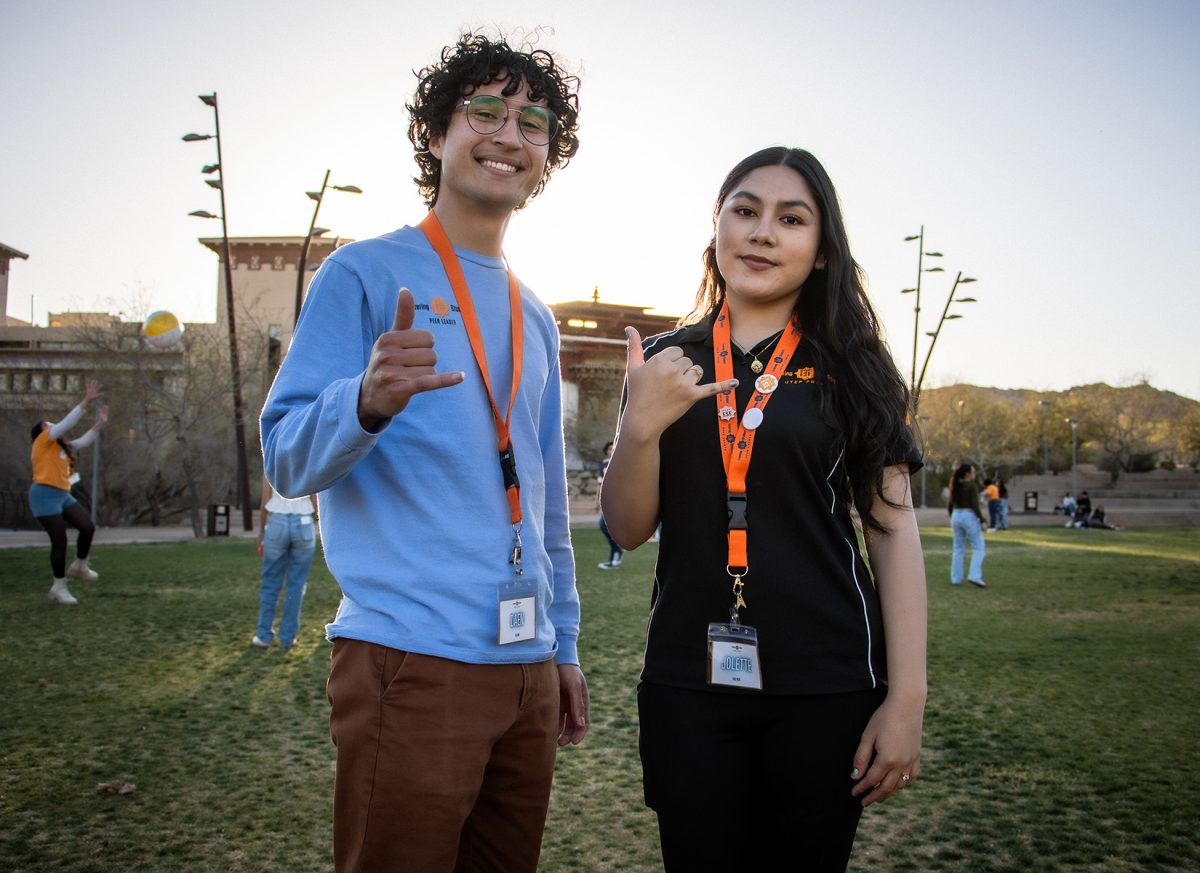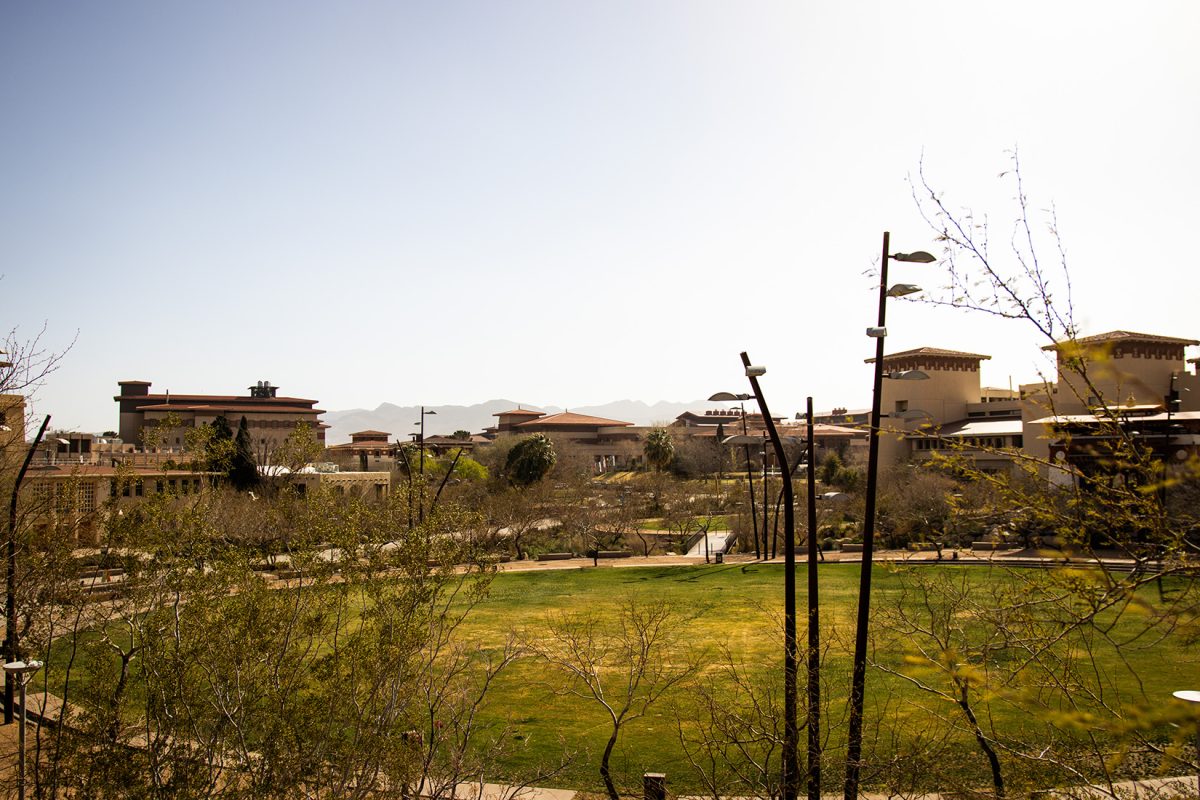Fresh off a flight from Austin, Texas and a little over the midway point of the 89th Texas Legislature session, Senator Cesar Jose Blanco, who represents the state’s 29th district in a 31-member senate, paid a visit to his alma-mater the University of Texas at El Paso (UTEP), to discuss Texas’ pressing issues currently being debated in the bi-yearly legislature.
Blanco focused on the bills affecting education, private school vouchers and firearms, categorizing the legislation into three different categories, “the good,” “the bad,” and “the ugly.”
“The Good.”
Senator Blanco highlighted Senate Bill 26, which increases teacher pay by doubling the existing Teacher Incentive Allotment. The incentive program was established to motivate teachers in the classroom to earn a pay raise. The first version of it in Texas was passed in 2019 by the 86th legislature.
Now, the program receives more funding in Texas through Senate Bill 26, legislation which was co-authored by Senator Blanco, and bi-partisanly sponsored.
“We all remember those teachers that made a huge impact in our lives,” Blanco said. “We just don’t pay them enough. Teachers in the state of Texas are paid $10,000 less than the national average. That’s not acceptable in my perspective.”

The bill, which passed unanimously through the senate, will provide an increase in pay based on district size and teacher experience. The districts with less than 5,000 students will receive $2,500 to increase the wages of teachers with three to five years of experience, and $5,500 to pay more to teachers with more than five years of tenure.
Meanwhile, school districts with 5,000 students or fewer will receive $5,000 to raise the salary of teachers who have three to five years of experience, and $10,000 to increase pay for teachers with five or more years of experience.
“If we want the best teachers in the classrooms, we got to really make sure that we’re paying them what they’re worth,” Blanco said.
Senate Bill 26 now awaits its fate in the state’s house of representatives.
“The Bad.”
Two years ago, the 88th Texas Legislature, through Senate Bill 17, made any form of diversity, equity and inclusion (DEI), including departments, offices or practices, illegal in all public Texas Universities. Now, the senate has passed Senate Bill 12, which if passed by the house, would ban DEI in K-12 public education.
“They’re trying to ban DEI in public schools, making it harder for teachers to have real conversations about race, about U.S. history, about identity,” Blanco said. “It’s important that we learn from the mistakes of our past and a lot of this stuff is being banned now in our schools.”
Unlike an earlier version, the bill approved by the senate did not include a provision that suggested public school districts could lose funding if they didn’t comply with the ban.
If passed by the house, Texas school districts will no longer be able to use DEI in hiring decisions, the creating of programs, rules or training regarding race, ethnicity, gender identity and sexual orientation. Instead, public school districts would be mandated to craft and enforce policies to discipline all employees participating in DEI related practices.
When DEI was officially banned in Texas higher education last year, the UT system cut 311 full and part time jobs, and eliminated 681 programs, training and contracts related to DEI.
The bill was sponsored and voted on solely by republicans in the state senate.

Senator Blanco then turned his attention to Senate Bill 1362, which aims to stop Texas from recognizing red flag laws.
Red Flag Laws, or Extreme Risk Protection Orders, allow a party to push for an individual to be removed from a firearm if the state court handling the request finds that the certain individual poses a threat to either themselves or others, then their state court issued ruling can result in the temporary removal of said firearm. The court’s ruling is not a criminal conviction, rather it’s a civil order.
“Unfortunately, we don’t have those laws in the state of Texas. We here in El Paso are very familiar with gun violence, especially after what happened in the shooting at Walmart,” Blanco said. “I think there’s a balance between the second amendment, I do believe in the second amendment, but I don’t think we should have these high-capacity weapons accessible to anyone.”
“The Ugly.”
Texas’ full senate, and a house committee recently passed Senate Bill Two, which if passed by the full house would give private school vouchers to Texas families.
The vouchers would grant a Texas household $10,000 per student for private schooling, and $11,500 to a household per student if that child is disabled. Those vouchers would be funded through public taxpayer money.
“This is a bill that I fought on the senate floor, because I think it diverts your taxpayer dollars from public schools, and it gives it to private schools to have no accountability,” Blanco said. “Choice is important, and the way they [lawmakers] framed this bill was that it’s giving parents the choice, but what we’re really doing is giving private schools the choice to pick and choose who they want to bring in.”
Senator Blanco proposed an amendment for the legislation, which would’ve required private schools to be open with parents about not having to follow any regulations except those of their own. That amendment failed.
Under the current state of the bill, private schools are not required to disclose acceptance rates for students, foreign language, special education or any other student accommodations.
Sebastian Perez-Navarro is the multimedia editor for the Prospector and can be reached at [email protected] or Instagram and X @sebastianpn8, and on LinkedIn @sebastianperez-navarro.









